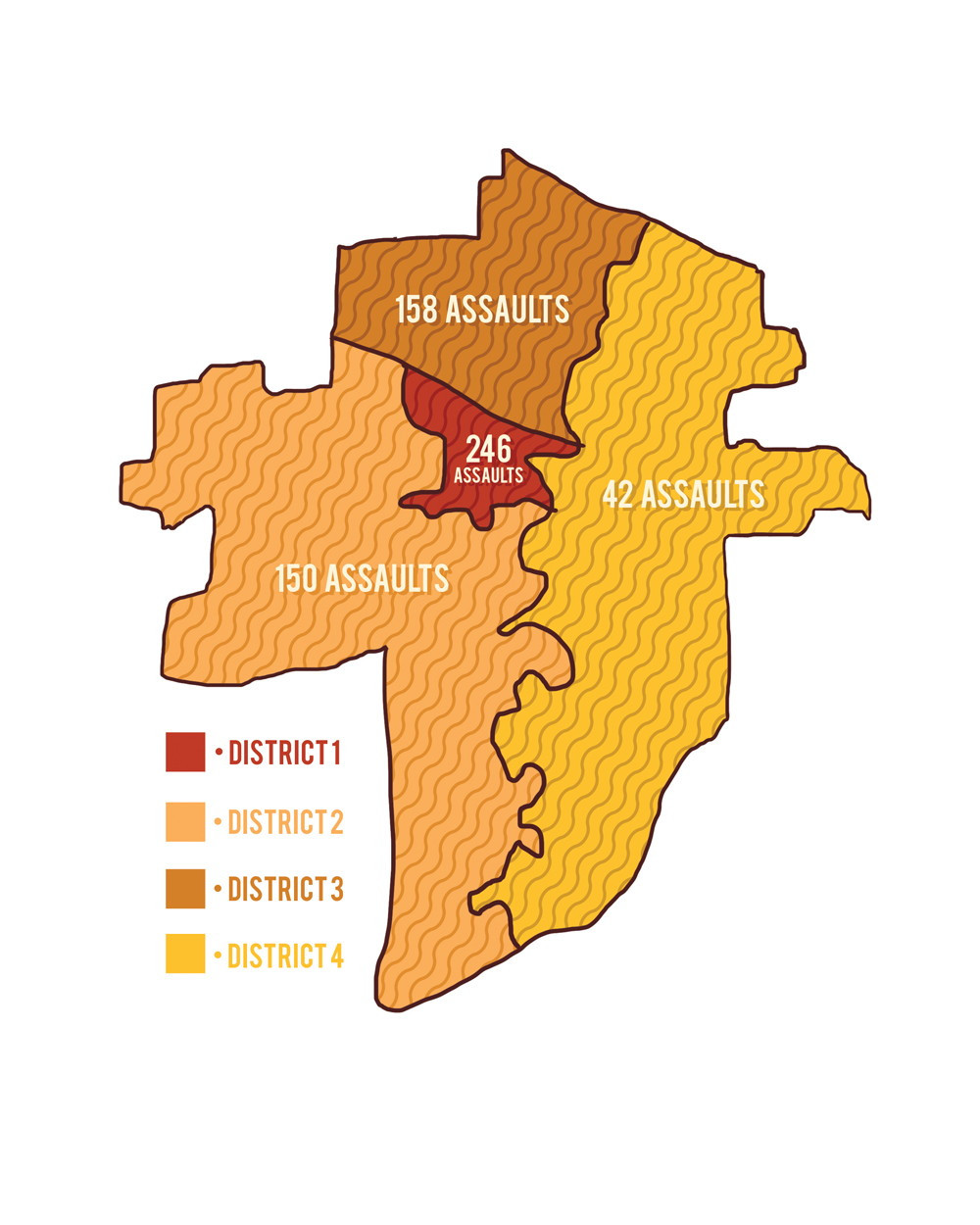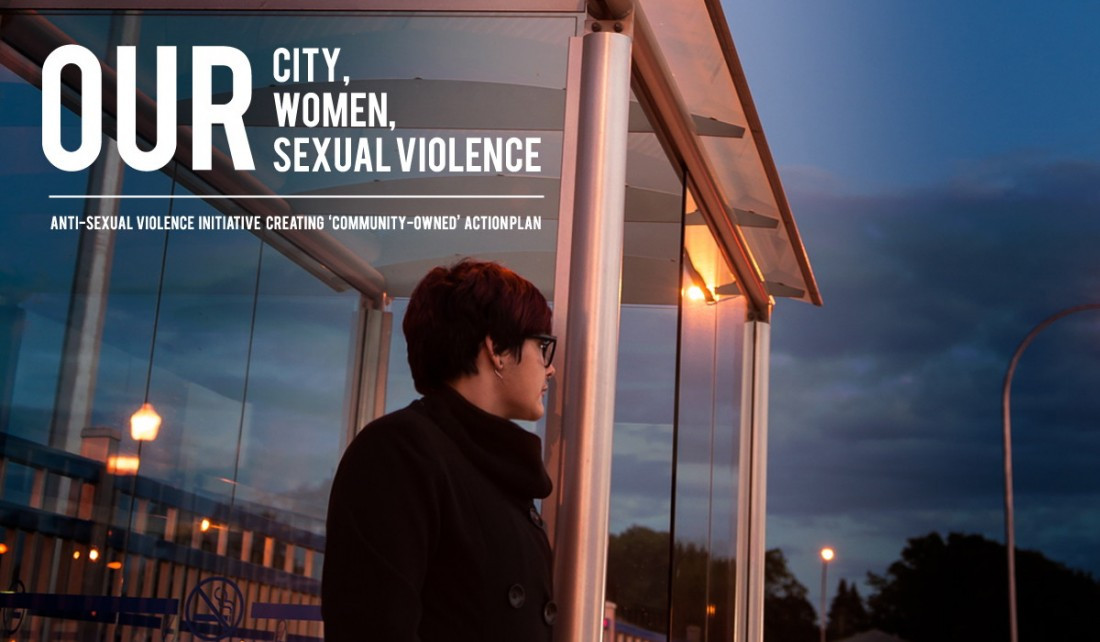Our city, our women, our sexual violence
Anti-sexual violence initiative creating ‘community owned’ action plan
On Sept. 1, 2014 two women contacted the Winnipeg Police Service to report being sexually assaulted.
One, travelling on Winnipeg Transit around 10 a.m. in the area of Portage Ave. and Balmoral St., was felt up by a man she didn’t know while sitting on the bus.
A second woman, also on Winnipeg Transit two hours later and in the same area, was groped.
A 54-year-old man matching descriptions provided by both women was picked up by police and arrested on two counts of sexual assault. He was released from custody on a promise to appear.
Sexual harassment and violence against women in Winnipeg, and across Canada, often goes unreported. Statistics from the 2013 Juristat, a Statistics Canada publication, say 9 in 10 non-spousal sexual assaults are never reported.
Professor Emeritus Dr. Sandra Kirby says victims of harassment don’t come forward because the decision is both emotional and difficult.
“Most people know that should a complaint be made it’s very difficult to make the complaint stick,” the retired University of Winnipeg sociology professor says. “It is very difficult not be re-victimized by the process itself.”
Still these two unnamed women spoke up and reported the assaults to the police.
Creating a culture where women feel safe reporting sexual assault is one goal of the UN Safe Cities Global Initiative - a program of the UN Women in use in New Delhi, India; Kigali, Rwanda and more.

“Each city develops their community-owned solution to the universal challenge of women’s and girls’ experience of and fear of sexual violence against in public spaces,” says Laura Capobianco, a senior policy specialist with UN Women, in an
email statement.
Winnipeg joined the UN Safe Cities Global Initiative in Dec. 2013. We are the first city in North America and one of the only cities, with the exception of Dublin, Ireland, that is not located in a ‘developing country.’
Since the initiative was announced a steering committee has been working to determine how to intervene in what Minister of Family Services Kerri Irvin-Ross then described as “unacceptably high rates of sexual violence against women.”
According to the Winnipeg Police Service’s annual statistical report there were 684 reports of sexual assault in 2013.
Sexual assault can mean many things as it exists on a continuum.
Kirby says it begins with the “things that are harassing and perceived as sexually harassing” and ends with “sexual exploitation and everything that entails.”
What it can entail is missing and murdered women; what Beth Ulrich, executive director of Manitoba Status of Women, calls the most serious manifestation of
sexual violence.
But before patrols are sent to every street corner, Ulrich emphasises the need for analysis and relationship building, and that’s what the steering committee is
currently doing.
“We’ve found that good initiatives are really the result of good relationships and trust between the stakeholders, and that takes time,” Ulrich, co-chair of the steering committee, says.
The steering committee, composed of 14 people representing communities and organizations, meets on a monthly basis to discuss where to focus efforts based on research that already exists.
“ All the secondary studies indicate that women face harassment because they are women, which is irrespective of class, caste or the religion they belong to.
New Delhi Scoping Study Report, Safe Cities Free Of Violence Against Women And Girls Global Programme, UN Women
Over the summer, Ulrich says the steering committee hired a student to begin a ‘scoping study’ that will inform how the initiative will move forward.
A scoping study, such as the one conducted in New Delhi, India will reveal the types of assaults women are facing, who the offenders are, and where instances of assault and harassment are occurring. The New Delhi scoping study, a candid and damning document, identified public transportation as one public space where women frequently felt unsafe.
“I used to commute to my college by bus,” says an anonymous woman from New Delhi in the scoping study, “but I have had a very bad experience, and I felt that walking home from college would be safer than traveling by bus.”
The steering committee also has the mandate to include voices of women from the community. Leslie Spillett, director of Ka Ni Kanichihk and a member of the steering committee, says Aboriginal women’s voices are being included in the dialogue.
“One of the biggest issues that women say they experience here is that they are viewed by many people in the community, including children, as being for sale,” Spillett says.
“Aboriginal women are considered prostituted women regardless of their age,” Spillett explains. “It underscores the dysfunction of that relationship and how people see indigenous women.”
Winnipeg’s scoping study is also expected to identify where sexual assaults are most likely to occur. The committee plans to reveal some of the ‘hot spots’ for harassment in an October report to the public.
The Winnipeg Police Service’s annual statistical report already offers insight into the matter. Locations of crimes are categorized by district, and District 1 (encompassing downtown and the University of Winnipeg), has the highest number of reported sexual assaults at 246 in 2013.
Ulrich says the U of W is an area of activity for the Safe Cities Initiative and it showed interest in building on anti-harassment programs already in place.
“Not that we’re saying the U of W is a hot bed, it’s that they’ve decided they’d like to
ensure they are doing the best they can,” Ulrich says.
Rorie Mcleod Arnould, president of the University of Winnipeg Student’s Association, says sexaul assaults have been reported on campus.
“In response, the UW has implemented a zero-tolerance policy for sexual assault and given all staff additional training in how to respond to sexual assault,” Arnould says via email.
“In partnership with the province and the UW, we’re going to work to raise awareness here on campus about a survey that can be completed by staff/students/UW community members about their experience with sexual violence here on campus.”
He says the awareness campaign will begin in October.
Ulrich says the working goal of the five year initiative is to ensure that relationships and public awareness on this issue are strengthened, and that the scoping study is finished.
“You have to be flexible in this work,” Ulrich says of the ongoing new information, but she is confident this initiative is moving at a good pace.
“This is something that every day in my office I am thinking about and working towards.”
Manitoba Status of Women will be presenting on the UN Safe Cities Global Initiative on Oct. 25 at 1:00 p.m. at Eckhardt-Gramatté Hall, University of Winnipeg RSVP: (204) 945-6281
Published in Volume 69, Number 3 of The Uniter (September 17, 2014)







